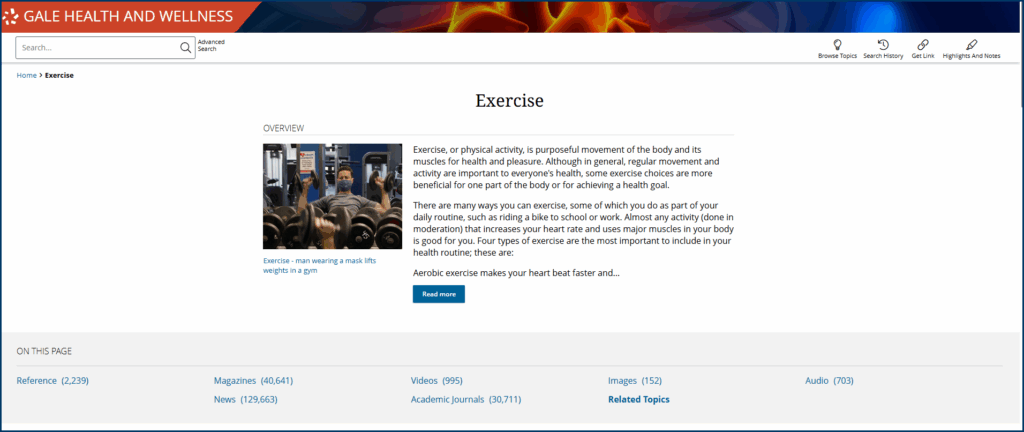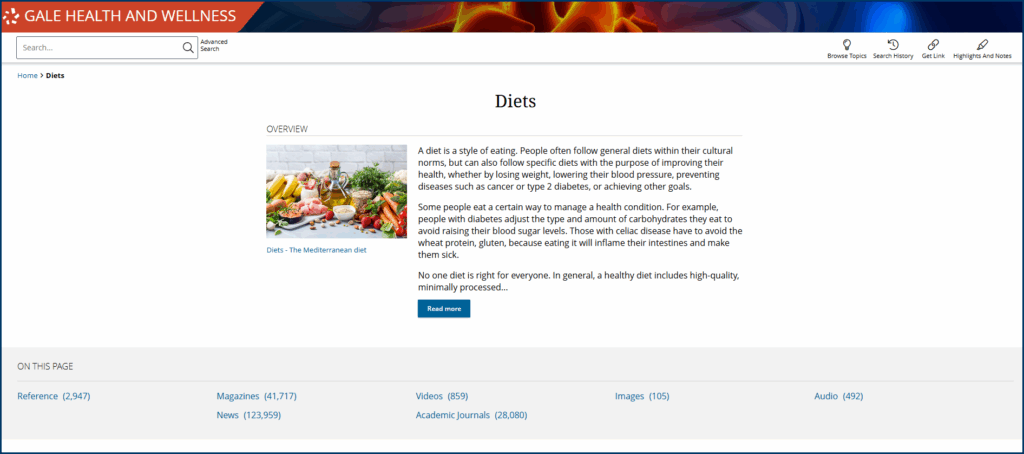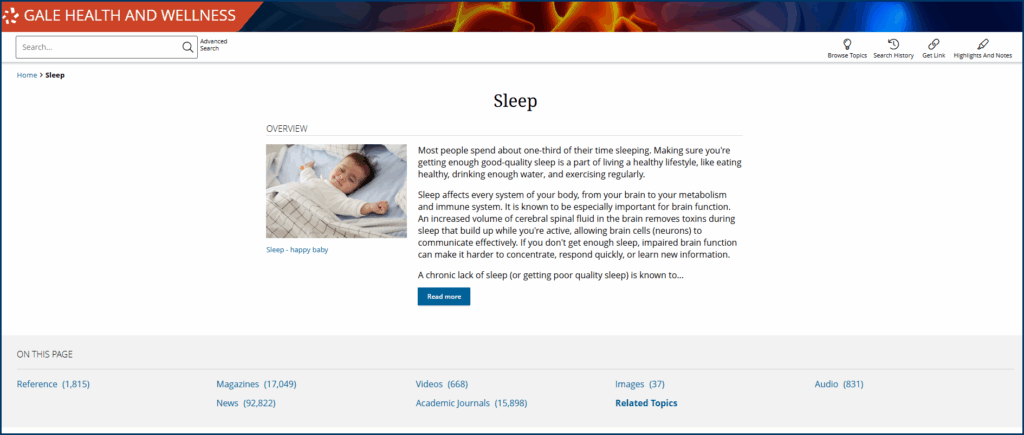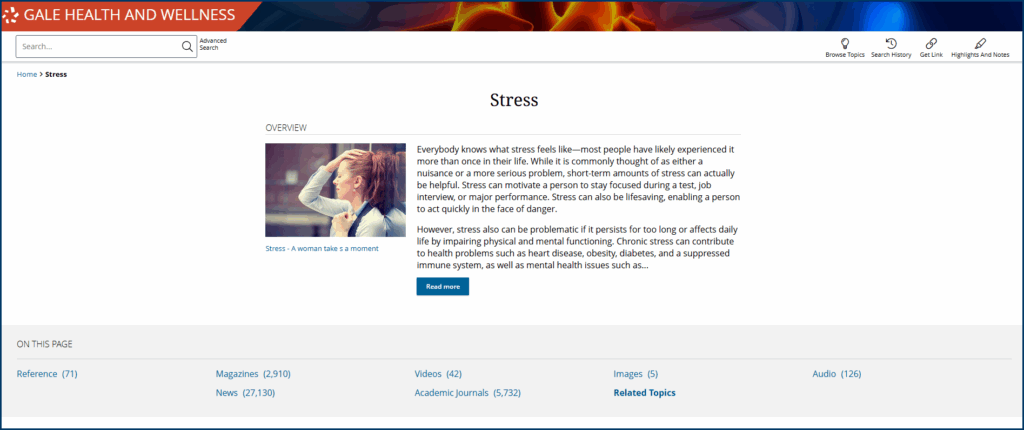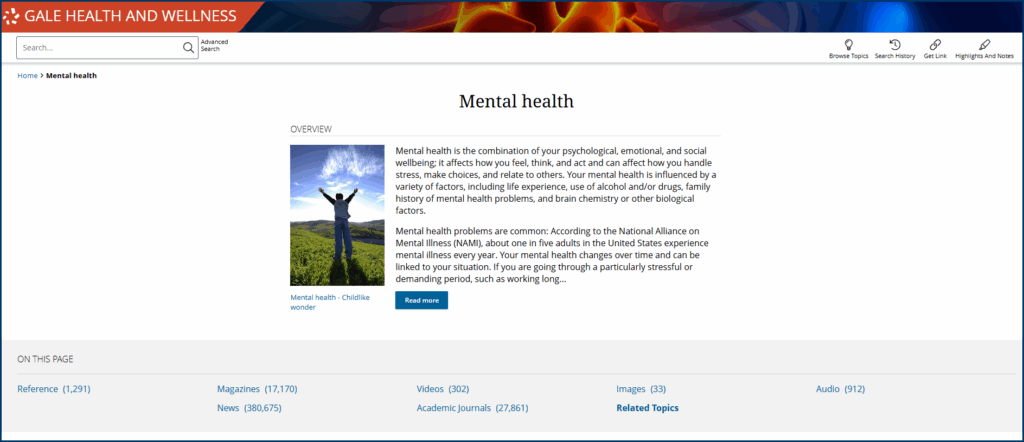As informational hubs and community builders, public libraries can become champions of National Wellness Month. Held in August each year, National Wellness Month provides an opportunity for individuals to reflect on and prioritize their physical and mental well-being.
Your library’s Gale Health and Wellness subscription can support National Wellness Month programming, from full-text medical journals and magazines to user-friendly summaries and videos. Gale Health and Wellness is a trustworthy and accessible resource that provides a big-picture, relevant foundation for the medical information your patrons need for long-term health.
This August, libraries can use Gale Health and Wellness to share six significant yet straightforward strategies for improving community well-being.
1. Get Patrons Moving
Exercise has several significant health benefits. Consistent physical activity strengthens bones and muscles, helps maintain a healthy weight, and substantially improves cardiovascular health by stimulating blood flow and fortifying the heart muscle. This last point is especially meaningful considering heart disease is the leading cause of death in the United States. Regular exercise also improves sleep, mood, and even judgment skills.
Exercise is vital, but integrating physical activity into a busy day is not always easy. Gyms can be intimidating, and memberships can be costly. Your library can help reduce the barriers to consistent exercise by guiding realistic fitness goals and offering free or low-cost workout activities.
This August, host a weekly yoga practice in or outside of your library. With minimal equipment and space needs, yoga is an excellent fit for library-based exercise and provides incredible physical and mental health benefits. A case study from the University of Utah libraries shows how it’s possible to partner with a yoga instructor training program, keeping the financial burden low for the library and participants alike. Plus, patrons can easily recreate their practice at home using free videos from Gale Health and Wellness.
2. Eat Well
A healthy diet is essential to overall well-being. After all, you are what you eat!
Healthy eating can help prevent chronic health concerns, such as obesity, diabetes, and heart disease. However, there is no one-size-fits-all approach when it comes to diet: some individuals eat to manage weight, others follow nutritional guidance as required for a medical condition, and some might work toward athletic gains. People’s choices around food reflect their culture, mood, budget, and preferences.
With all this variability, the library shouldn’t do any heavy lifting around nutritional education or dietary recommendations (that should stay between patrons and their medical providers). Instead, library staff can use Gale Health and Wellness to share basic healthy eating guidelines and strategies.
A well-balanced diet should honor recommended serving sizes and feature minimally processed foods. Aside from information sharing, the library can facilitate improved access to better eating. For example, the library could partner with a local farm and serve as a convenient pickup location for their community shared agriculture program. You might also consider sharing easy recipes that incorporate healthy, whole-food ingredients.
3. Practice Good Sleep Hygiene
People spend about one-third of their lives sleeping, or an average of seven hours daily. While this sounds like a lot of time snoozing, we actually sleep the least of our primate relatives. Human sleep is especially deep, helping us recharge our brains efficiently.
During sleep, nutrient-rich cerebrospinal fluid flushes toxins from our brains. This daily cleanse stimulates brain activity once we’re awake. Conversely, poor sleep quality leads to impaired cognitive function, making it difficult to communicate and concentrate. As such, sleep is critical during significant human developmental phases—notably early childhood and teenage years.
The term “sleep hygiene” refers to a person’s bedtime routine. While good sleep hygiene practices can vary, Gale Health and Wellness provides supportive, medically recommended guidance to help patrons reflect on and potentially adjust their bedtime routines. Libraries can also feature a healthy sleep reading list or even develop a bedtime playlist.
4. Share Simple Stress Management Techniques
Some degree of stress is normal and healthy; it helps us adapt and respond to a challenge. However, too much stress can cause serious mental and physical health concerns. Unfortunately, Americans struggle with high stress levels, with many identifying the economy and political climate as leading causes. Other significant daily stressors may include personal finances, romantic relationships, and family dynamics.
Your library can help patrons identify and better manage their stress this August. Gale Health and Wellness houses content on effective and accessible relaxation techniques. Most of these coping skills—such as box breathing, spending time in nature, or drawing—are free and widely accessible. You might even create a “relaxation station” within the library; this space could feature calming music, coloring pages, puzzles, comfortable seating, or maybe a lavender essential oil diffuser.
5. Champion Mental Health Awareness
Mental health is complex, encompassing psychological, emotional, and social well-being. Annually, one-in-five US adults experience a mental health concern, with anxiety and depression topping the list of conditions.
Despite its prevalence, mental health still carries stigma, creating unnecessary barriers for those seeking support and treatment. Instead, social connectedness, education, and increased access to mental health services are vital steps toward treatment.
If resources allow, your library can serve patrons—especially those from more vulnerable populations—by developing an inventory of mental health-related resources.
To help, libraries can feature the hundreds of easy-to-read reference summaries related to cognitive well-being in Gale Health and Wellness. Your directory may also include free community exercise classes, income-based mental health services, and information on local advocacy organizations. For any educators in your community, Gale offers strategies for supporting mental health in the classroom as well.
6. Decrease Screen Time
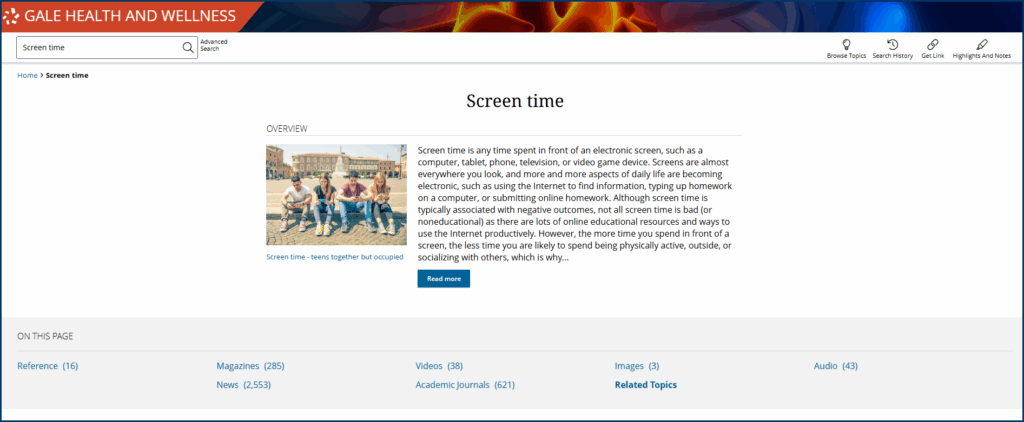
Americans, especially teens, are increasingly glued to their screens. The Centers for Disease Control estimates that US adolescents spend upwards of eight hours per day in front of a screen. While entertaining, excessive screen time contributes to several concerning mental and physical health issues, including irregular sleep schedules, behavioral problems, poor posture, and eye strain.
The American Psychiatric Association has even added internet addiction to its Diagnostic and Statistical Manual of Mental Disorders. Medical professionals urge families to take these trends seriously and implement boundaries around screen time. Gale Health and Wellness offers valuable content on screen time research and related recommendations, such as a digital detox road map.
Public libraries can share these facts and plan screen-free activities for patrons. Host a board game night or perhaps a community picnic on the lawn. You might even share screen time facts as you promote your summer reading program, encouraging families to pick up a book instead of their phones.
National Wellness Month is a great time to approach patron well-being from a holistic perspective. Of course, as the seasons change, it can be challenging to maintain the healthy habits developed over the summer. Luckily, with help from Gale Health and Wellness, your library can promote community health year-round.
If your library isn’t a current Gale subscriber, contact a local representative to learn more about community-driven resources.


